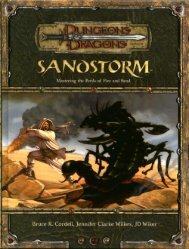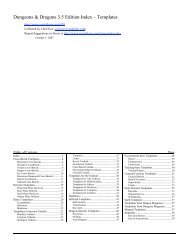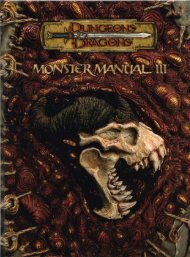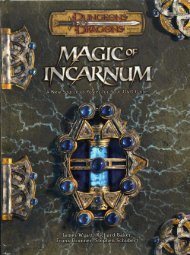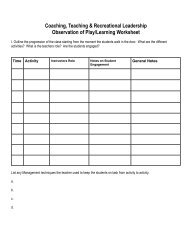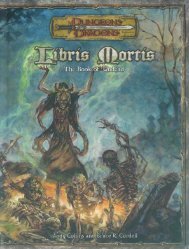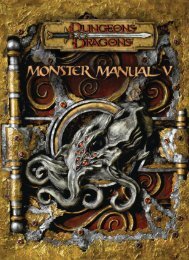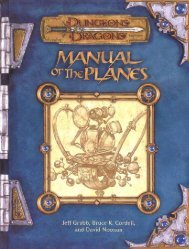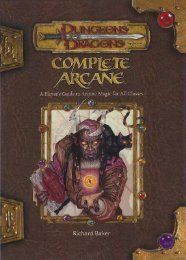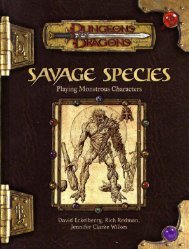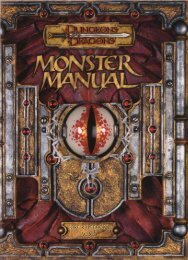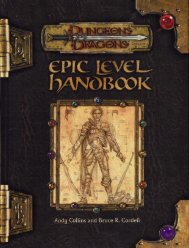Races of Wild
Races of Wild
Races of Wild
- No tags were found...
Create successful ePaper yourself
Turn your PDF publications into a flip-book with our unique Google optimized e-Paper software.
a cart (home to a single halfling and typically pulled by adonkey, pony, or occasionally a team <strong>of</strong> goats). All wagonsare covered and built <strong>of</strong> sturdy hardwood to resist rot andmissile weapons. Halflings <strong>of</strong>ten treat their wagons withwater- and flame-retardant materials.Each wagon contains a family’s personal possessions,clothing, food stores, and the equipment for whatever craftsor pr<strong>of</strong>essions family members pursue. All wagon doors canbe locked but rarely are while in camp.While on the move, caravans usually travel by day and campin the open at night. Each family is responsible for its own food,so family members forage for fruit and vegetables and raise theirown meat animals—usually goats, chickens, turkeys, cows,pigs, or rabbits. The larger animals trot alongside the wagon,while the smaller ones usually ride in coops or hutches; all areturned loose to forage when the caravan settles into a camp.One member <strong>of</strong> the family usually cooks the meals, thoughin some families that responsibility rotates.LeadersThe following <strong>of</strong>ficials are present in most caravans. Otherfunctions may also exist depending upon the kinds <strong>of</strong> workthe caravan members usually undertake and the races withwhich they usually associate.Head Teamster: This <strong>of</strong>ficial sets the order <strong>of</strong> wagonswhen the caravan moves, decides when to start and stop, anddetermines the direction <strong>of</strong> movement. When informed <strong>of</strong>potential hazards by the scout, he can decide whether to facethem or avoid them. The head teamster also calls for morewagons to be built should they be required.Scout: The scout is an outrider who travels ahead <strong>of</strong> themain caravan to spot potential hazards, such as box canyons ororc strongholds. The scout reports back to the head teamsterevery two hours. In particularly dangerous or rugged areas, acaravan may employ a chief scout and several subordinates.Trailer: Charged with riding behind the caravan, thetrailer picks up stragglers and herd animals that have wandered<strong>of</strong>f. Her primary task is to ensure that no one gets lostand falls behind, and she also serves as rear scout for thecaravan. Should a significant problem develop at the rear,she can call for an emergency stop. As with scouts, caravansometimes use several trailers.Chief Herder: This <strong>of</strong>ficial is in charge <strong>of</strong> all the animalsthat travel with the caravan. The chief herder ensures thatthe animals have enough time to forage and that sufficientfood and water are available. While the caravan moves, hetravels up and down the line <strong>of</strong> wagons, checking the animalsfor signs <strong>of</strong> exhaustion or illness. He tends to any seriousinjuries on the spot and addresses any minor ones when thecaravan stops for the night. While in camp, he ensures thatthe animals are fed. When entering areas where food is scarce,he ensures that the caravan carries sufficient food and waterto sustain the animals as well as the people.Old One: Usually an elderly halfling, the old one decidesinterclan disputes and advises the head teamster and clan leaderson direction <strong>of</strong> movement and strategy for negotiations.An old one occasionally has levels in diviner or some othermeans <strong>of</strong> magical knowledge.Blacksmith: Respected for her importance to the community,the blacksmith equals the chief herder in rank. Thetwo confer on issues such as what kinds <strong>of</strong> loads and terrainthe caravan’s vehicles and mounts can take and what repairsare needed at any given stop.Wheelwright/Wainwright: These two functions—repairing wheels and wagons and building new ones asneeded—may be handled by a single individual in smallcaravans or two different halflings in larger ones.Cook: Most families make their own meals, but the cookensures that those halflings who are busy with other tasks allthe time (such as the scout, the blacksmith, and the trailer) getadequate meals. The cook is the keeper <strong>of</strong> the supply wagonthat carries extra food stores for the caravan as well as a widearray <strong>of</strong> cooking implements.Herald: This <strong>of</strong>ficial serves as the mouthpiece for thecaravan. She deals with outsiders, asking permission to camp,determining what services are needed in a given area, andproviding information on the kinds <strong>of</strong> work that the peoplein the caravan can do.Cleric or Deacon: Caravans <strong>of</strong>ten have a cleric, though somehave several and others none at all. The cleric is responsiblefor <strong>of</strong>ficiating at marriages and funerals and generally lookingout for the spiritual well-being <strong>of</strong> the community.Most halflings, however, worship the deities <strong>of</strong> their choicewithout the aid <strong>of</strong> a cleric. In such cases, a layperson knownas the deacon administers the rituals when needed, ensuresthat homage is paid to the deities when appropriate, and keepstrack <strong>of</strong> ceremonial items for the community.Disputes and LawsDisputes among halflings happen frequently, but they arerarely important enough to cause a serious rift. Quarrels overpractical jokes, who buys ale, or other such small mattersare much more common than deadly fights over potentialmates, property, or beliefs. Halflings view property <strong>of</strong> anykind, including their own coins, as transient. It’s nice whenone has plenty <strong>of</strong> money, but there’s always more to be foundwhere that came from.Laws exist within halfling clans to cover the worst <strong>of</strong>crimes, but halflings see no point in trying to make rules forevery argument. They are always free to separate from theircommunities to go adventuring or to join others <strong>of</strong> theirclan in other caravans at any time. Thus, should enmity existbetween two halflings for a long period, they usually simplygo their own ways.Disputes that cannot be resolved peacefully between theparties are adjudicated by the clan leader or by the caravan’sor settlement’s old one, depending upon whether the partiesare from the same or different clans.LONERSThe famous halfling wanderlust ensures that most halflingsspend at least a few years <strong>of</strong> their lives wandering alone,CHAPTER 2HALFLINGS49



